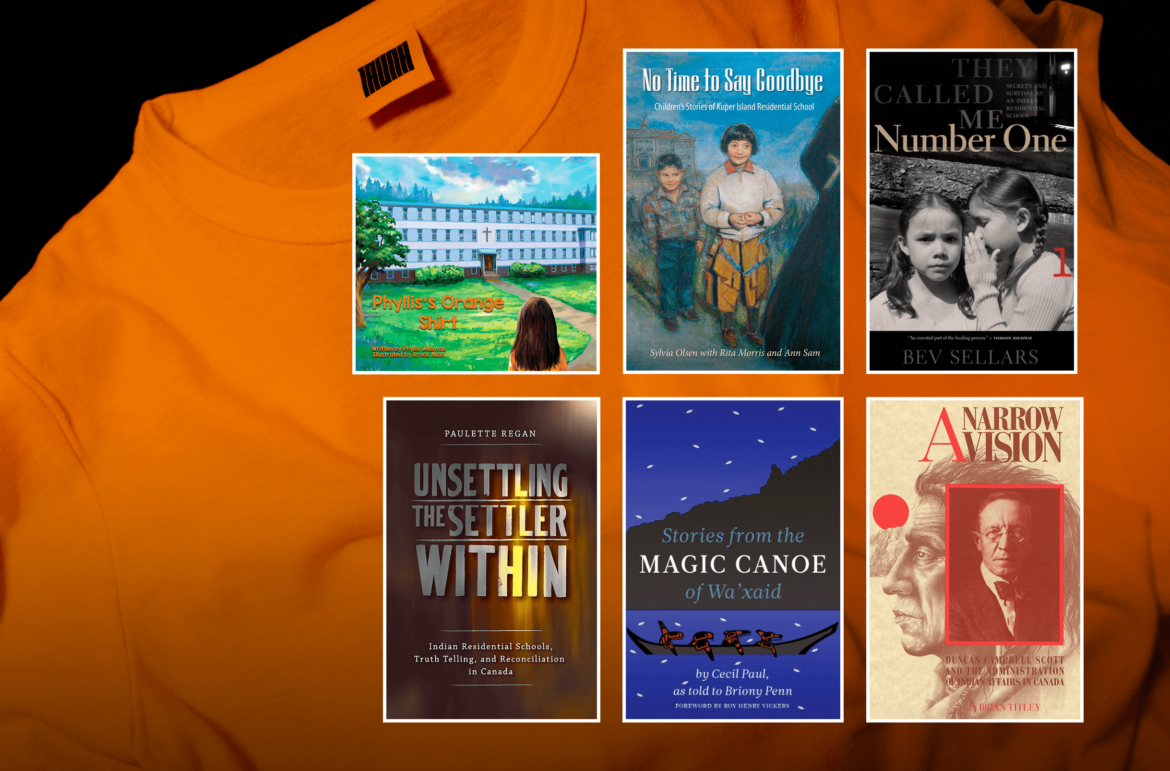Orange Shirt Day, held annually on September 30th, is a day to mark the impact and legacy of the Residential School system and to commit to the ongoing work of reconciliation. Orange Shirt Day began in Williams Lake in 2013, inspired by the story of Phyllis (née Jack) Webstad, a third-generation Residential School Survivor. Webstad is Northern Secwépemc (Shuswap) from the Stswecem’c Xgat’tem First Nation (Canoe Creek Indian Band) and was born in Dog Creek. On her first day of Residential School at age six, Webstad’s new orange shirt — bought by her grandmother — was taken from her.
Though this year’s Orange Shirt Day is now over, the need to witness and honour the experiences of Survivors and their families remains imperative.
We’re recommending six Orange Shirt Day reads to raise awareness and deepen understanding.
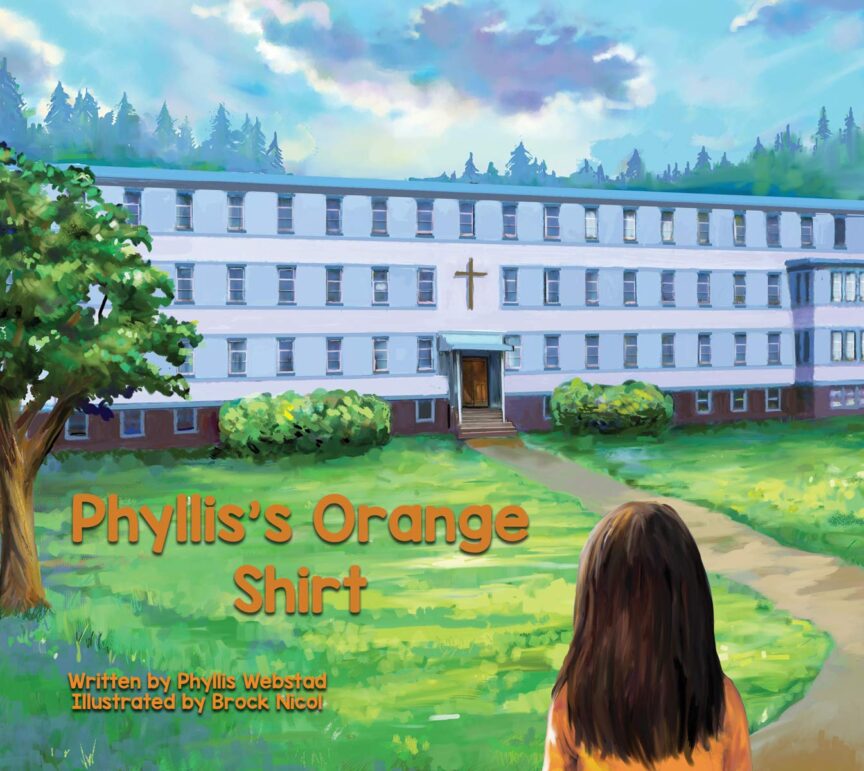
Phyllis’s Orange Shirt
by Phyllis Webstad (Medicine Wheel Education)
No list about Orange Shirt Day would be complete without the story of Phyllis Webstad herself. In this touching and informative picture book, illustrated by Toronto-based illustrator Brock Nicol, Webstad recounts her first day of school and the orange shirt her grandmother gifted her. Recommended for young readers aged 4–6, Phyllis’s Orange Shirt is an essential introduction into the effects of discrimination and Indigenous relations in Canada.
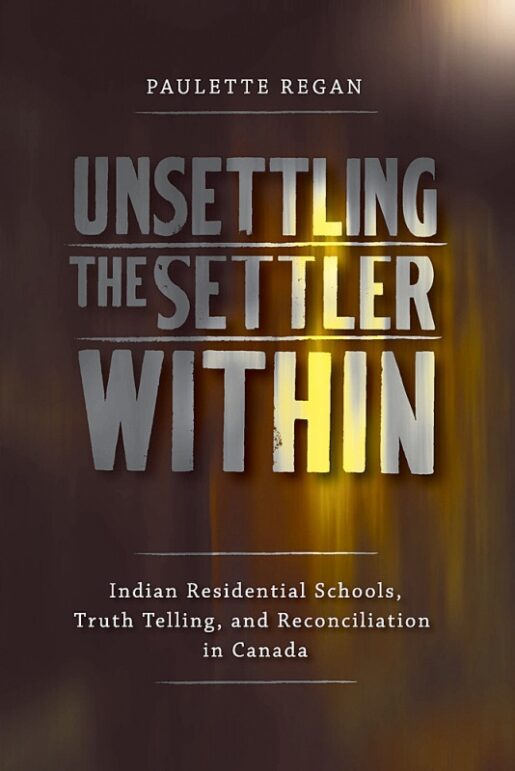
Unsettling the Settler Within: Indian Residential Schools, Truth Telling, and Reconciliation in Canada
by Paulette Regan (UBC Press)
In 2008, Canada established the Truth and Reconciliation Commission in an effort to re-evaluate and reform its relationship with Indigenous Peoples across Canada. Part of that process was to apologize to Residential School Survivors who experienced trauma, displacement, and indoctrination in these schools up until the last closed in 1996. Written by Paulette Regan, the former director of research for the Truth and Reconciliation Commission of Canada, Unsettling the Settler Within is a call for all non-Indigenous groups to decolonize their relationships, biases, and knowledge of Canada through intense introspection. Regan’s work is essential reading for all current and future policymakers, politicians, educators, students and Canadians ready to interrogate their beliefs and role in perpetuating colonial practices.
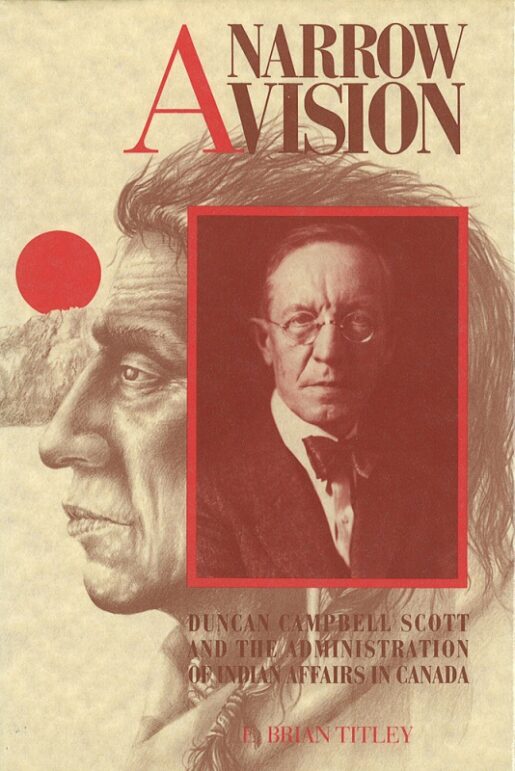
A Narrow Vision: Duncan Campbell Scott and the Administration of Indian Affairs in Canada
by E. Brian Titley (UBC Press)⠀
As Deputy Superintendent General of Indian Affairs and a chief enforcer of the Indian Act (even while admitting the higher rates at which children in Residential School care died), Duncan Campbell Scott’s career as politician and poet was complexly rooted in colonial thinking and power, and ultimately, as A Narrow Vision argues, incredibly damaging to the lives and heritages of Indigenous Peoples in Canada. The only study of its kind in the early 20th century and the only work (at the time) to focus on Scott’s role in government, A Narrow Vision sets the stage for understanding the barriers, biases and dangers inflicted upon families and communities at the Canadian government’s direction.
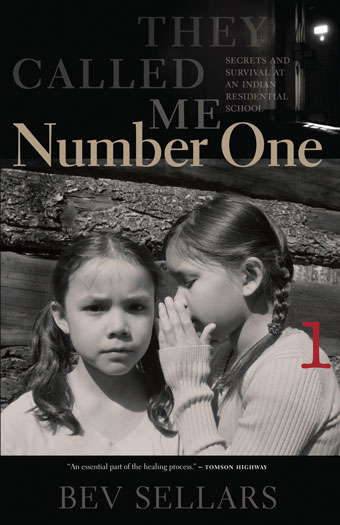
They Called Me Number One: Secrets and Survival at an Indian Residential School
by Bev Sellars (Talonbooks)⠀
A BC Book Prize finalist and award-winning title, Bev Sellars’ They Called Me Number One is an essential and foundational text in not only understanding the lasting impacts of Residential Schools in Canada, but also the incredible resilience and strength of the children who survived them. As her publisher writes, Residential Schools “endeavored to ‘civilize’ Native children through Christian teachings; forced separation from family, language, and culture; and strict discipline. Perhaps the most symbolically potent strategy used to alienate Residential School children was addressing them by assigned numbers only—not by the names with which they knew and understood themselves.” A former Xat’sull Chief and community advisor for the BC Treaty Commission, Sellars has been an instrumental and powerful voice for justice, anti-racism and environmental stewardship in her community. They Called Me Number One is essential reading for all.
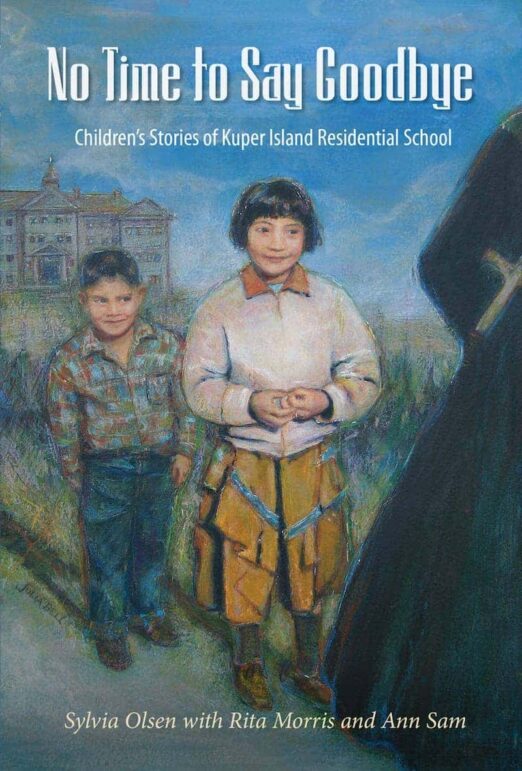
No Time to Say Goodbye: Children’s Stories of Kuper Island Residential School
by Sylvia Olsen with Rita Morris and Ann Sam (Sono Nis Press)
A fictional account of five children amalgamated from the true testimony of members of the Tsartlip First Nation, No Time to Say Goodbye is an unforgettable and touching tale of children accustomed to island life and warm, close-knit community thrust into the strict and cold world of Residential School life. Despite this, the children seek hope and find adventure amongst their peers and friends, forming bonds that can never be broken. Sometimes sad, sometimes funny, No Time to Say Goodbye is a beautiful balance of a harsh reality and the affirmation of hope and life.
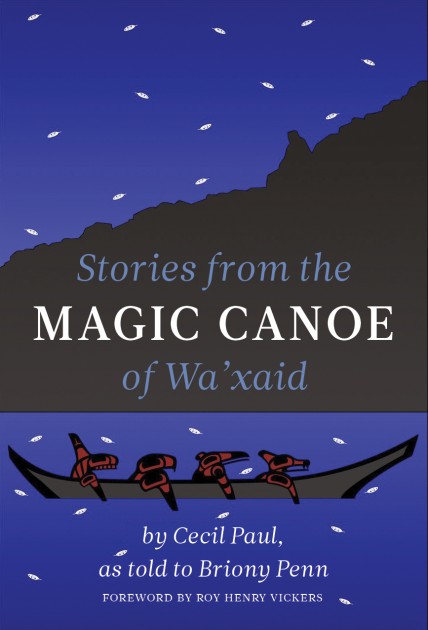
Stories from the Magic Canoe of Wa’xaid
by Cecil Paul, as told by Briony Penn (Rocky Mountain Books)
A respected Elder, activist and orator, and one of the last fluent speakers of his people’s language, Cecil Paul’s highly-acclaimed Stories from the Magic Canoe of Wa’xaid is a profound and priceless documented history of Xenaksiala traditional knowledge and a lifetime of experience, suffering, and survival. Meticulously transcribed by Briony Penn and featuring a foreword by beloved Indigenous artist Roy Henry Vickers, Stories from the Magic Canoe of Wa’xaid is a treasure trove of knowledge from a Xenaksiala Elder and leader, and an inspiring read for anyone, regardless of background.
What other books have contributed to your own processes of reconciliation and decolonization? Share them with us at @readlocalbc on either Twitter or Instagram. We’d love to hear from you.

